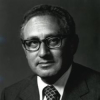Henry A. Kissinger

Henry A. Kissinger
Henry Alfred Kissingeris an American diplomat and political scientist. He served as National Security Advisor and later concurrently as United States Secretary of State in the administrations of presidents Richard Nixon and Gerald Ford. For his actions negotiating the ceasefire in Vietnam, Kissinger received the 1973 Nobel Peace Prize under controversial circumstances, with two members of the committee resigning in protest. Kissinger later sought, unsuccessfully, to return the prize. After his term, his advice has been sought by world leaders...
NationalityGerman
ProfessionStatesman
Date of Birth27 May 1923
CountryGermany
People are now starting to explain the Cold War. Even in the crises at that time the survival of millions of people was at stake. And we (the USA) had to threaten the other super power with retaliation to prevent it from doing something to us. Today we live in a world in which a lot of things are in flux. That creates a lot of fear. But it is also a time of great opportunity. And I would call on today's statesmen to not allow their thinking to be directed by fear.
Well, on the American side, every new administration has to cut its teeth in a crisis, because before a crisis, you don't really know what your various subordinates are thinking under stress.
I see the future of China as growth. I think that historically China has often gone through periods of consolidation, and then periods of sort of weakening central authority. They undoubtedly face tremendous challenges.
I don't think we should pay people to fight terrorism. I would be amazed if they asked for anything in return.
I think China will do nothing to obstruct it, and they probably will go along with it.
I don't think that that's a desirable option for us. Besides, it wouldn't work, because there are too many other countries that are willing to work economically with China. But I don't think the basic relationship depends on economics. It depends on a political understanding of what is required for peace in Asia.
Every American president, regardless of party, has said that America has an intense interest in a peaceful resolution. And I think it should be left at that.
I think a resumption of the Cold War would be a historic tragedy. If a conflict is avoidable, on a basis reflecting morality and security, one should try to avoid it.
The Chinese military budget today is officially listed as, I think, about $15 billion. But even if you double it, that's only a tenth of ours. So the possibility of China challenging the United States for the next ten years over the Pacific is next to zero. There could be a conflict between us and China over Taiwan, but I think that, too, will not occur with the proper policies on both sides.
I don't have a brief for every single reaction of Israel, but I think it is important that the political negotiations occur free of the threat of terrorism.
Well, the capacity of French intellectuals to understand a Texan way of thinking is finite.
You should not think that you can shape history only by your will. This is also why I'm against the concept of intervention when you don't know its ultimate implications.
People think responsibility is hard to bear. It's not. I think that sometimes it is the absence of responsibility that is harder to bear. You have a great feeling of impotence.
Becoming conscious is of course a sacrilege against nature; it is as though you had robbed the unconscious of something. The nice thing about being a celebrity is that if you bore people they think it's their fault.